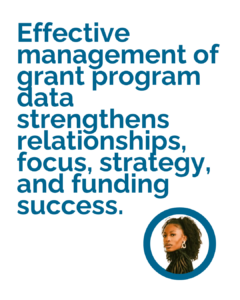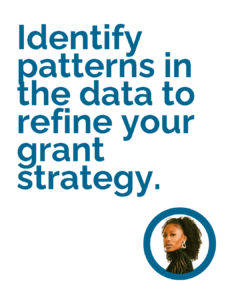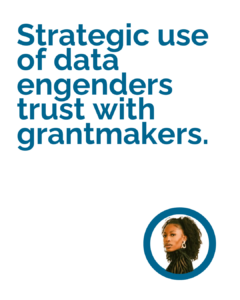As my colleagues have explored in previous blog posts, including this article on how to write a persuasive need statement, using accurate data in your proposals is a cornerstone of successful grant writing. However, not all data is the same. One critical yet often overlooked area is grant program data—the information related to donor details, application deadlines, submission tracking, and funding history. Managing this data effectively ensures nonprofits can strengthen relationships with grantmakers, prioritize their focus, improve their application strategy, and secure more funding.
Despite its importance, many nonprofits struggle to track and utilize grant program data efficiently. As a Project Coordinator at Elevate, I work every day to ensure my clients have clear, accurate data to support decision-making and ensure their grant programs run smoothly. In this blog, I will explore why it matters and provide actionable tips from my experience with several organizations to help nonprofits improve their grant data management.
Why Grant Program Data Matters in Grant Writing
Strengthening Relationships with Grantmakers
When grantmakers can see that their grantees are organized and strategic in their interactions, it engenders trust and confidence in the nonprofit. Tracking key details such as past funding amounts, reporting deadlines, and communication history – and using these data points to make decisions about how to approach a grantmaker – helps organizations tailor proposals and maintain strong relationships.
For example, some funders won’t allow you to submit a proposal for a renewal grant without submitting a final report, and often that reporting information can be found in the weeds of a grant agreement. When this type of information is tracked properly it helps to avoid missed opportunities for financial support.
 For example, one Elevate client had gaps in their grant calendar where they should have had grant report deadlines. We discovered this was due to missing and poorly tracked grant agreements – where the information about reporting requirements could be found! This information gap led to several missed report deadlines, putting our client’s funder relationships at risk and delaying new funding (because reporting was required before grants could be renewed.) Once we discovered the source of the missing information, we were able to compile and organize grant agreements and pull reporting deadlines and requirements from those documents to fill those crucial gaps in the calendar.
For example, one Elevate client had gaps in their grant calendar where they should have had grant report deadlines. We discovered this was due to missing and poorly tracked grant agreements – where the information about reporting requirements could be found! This information gap led to several missed report deadlines, putting our client’s funder relationships at risk and delaying new funding (because reporting was required before grants could be renewed.) Once we discovered the source of the missing information, we were able to compile and organize grant agreements and pull reporting deadlines and requirements from those documents to fill those crucial gaps in the calendar.
Beyond maintaining relationships, tracking interactions with grantmakers allows nonprofits to personalize their approach. By logging notes from conversations with program officers, feedback on proposals, and preferences about how and when requests are made, organizations can refine their applications to align with a funder’s priorities.
Another nonprofit that Elevate worked with was fortunate to work with a gracious program officer who was willing to provide feedback on our application in advance of our submitting it. By addressing this feedback in our application, we significantly strengthened our chances of securing funding. And, because the grantmaker was aware of our client’s intent to submit a request, the application was expected which further increases the likelihood of grant allocation.
Improving Application Success Rates
Nonprofits that manage their grant program data effectively can refine their application strategies. By analyzing data on past submissions, organizations can identify patterns—such as which types of requests are most successful (e.g. program restricted requests vs. general operating requests) or which types of grantmakers tend to fund similar projects.
Another key benefit is the ability to analyze rejection trends. If an organization sees a pattern of rejections from a specific type of funder, they can reevaluate how to frame their applications or shift focus to better-aligned funding sources. Proactively assessing past grant performance enables smarter, more targeted outreach. (Also check out this blog post for what to do when a grant is declined!)
For example, one Elevate client applied for a grant several times and was not awarded funding. They decided to shift their efforts instead to new funding opportunities and won a grant from an organization they had not previously partnered with. This was a great way to utilize data on the organization’s history with a grantmaker (i.e. multiple rejections) to determine whether an opportunity is worth pursuing again in the future.
Avoiding Missed Deadlines and Compliance Issues
Deadlines and reporting requirements vary across grantmakers. Missing a deadline—or failing to submit required reports—can jeopardize future funding opportunities. Beyond deadlines, tracking compliance requirements, such as submitting receipts or financial statements, ensures that nonprofits meet all necessary reporting expectations. Some funders require extensive narrative progress reports, while others focus on financial accountability. Having a centralized data system helps organizations quickly retrieve the necessary documents when requested, reducing stress and improving efficiency.
Common Challenges in Grant Data Management
Disorganized or Incomplete Records
Many nonprofits store grant information in multiple locations—spreadsheets, emails, or even paper files—leading to gaps and inconsistencies. This is especially true when a team member who is holding critical information leaves the organization or needs to be away unexpectedly. A centralized system ensures all relevant details are easily accessible and up to date.
Some organizations struggle with inconsistency in data entry, with different team members tracking information in different formats. Establishing a standardized method can ensure data remains accurate and easy to interpret. This can be as simple as having standard naming conventions for documents or folders organized by year and grantmaker. Consistency is key!
Loss of Institutional Knowledge
 Staff turnover can lead to the loss of critical grant program data. Without a structured system, new team members may struggle to pick up where others left off. Establishing clear documentation, standards, and processes mitigates this risk and allows for smoother transitions between teams.
Staff turnover can lead to the loss of critical grant program data. Without a structured system, new team members may struggle to pick up where others left off. Establishing clear documentation, standards, and processes mitigates this risk and allows for smoother transitions between teams.
An Overwhelming Volume of Data
Some organizations collect excessive information without a clear strategy for its use. Prioritizing key data points such as funding cycles, grant amounts, feedback notes, and reporting requirements—prevents information overload.
Nonprofits should also focus on actionable data that directly impacts their ability to secure funding. Instead of tracking every minor interaction, prioritizing key engagement milestones, funding patterns, and funder preferences ensures the most relevant insights are easily accessible. Adding dates to these interactions and the point of contact can help track the lifespan of these organizational interactions.
Best Practices for Managing Grant Program Data
Standardize Data Entry and Tracking
Establish a uniform system for logging grant-related information. Consider using a grant management platform like Salesforce or Notions to centralize tracking. Clients working with Elevate have a detailed and organized grants calendar with historical information for the duration of our partnership. This grant calendar is consistently updated with relevant information.
A grant tracking system should include for each grantmaker:
- LOI and proposal deadlines
- Grant submission requirements (application points, required documents)
- Grant submission history (dates, amounts, outcomes)
- Reviewer feedback
- Reporting deadlines
- Key interactions and communications with program officers
- Renewal opportunities (i.e. plans for future funding requests)
For more tips, check out this Elevate blog post on How to Manage a Grant Calendar.
 Set Up Automated Reminders
Set Up Automated Reminders
Missing a proposal deadline can mean missing out on funding, whereas missing a reporting deadline can jeopardize your relationship with a grantmaker. Automated calendar reminders for upcoming deadlines, progress reports, and renewal opportunities keep nonprofits on track.
Train Your Team on Data Best Practices
A well-trained team ensures consistency in grant tracking. Regular training on data management best practices helps organizations avoid common pitfalls. Elevate has helped clients implement grant tracking that drastically improved internal coordination and grant success rates through our trained staff.
Regular training can also help organizations adapt to changes in funder expectations. By staying informed on best practices, teams can adjust strategies in real time to improve their success rates.
Conclusion
Accurate and well-managed grant program data is essential for securing funding and building strong relationships with grantmakers. By implementing structured tracking systems, nonprofits can increase efficiency, improve proposal success rates, and maintain compliance with funding partners’ requirements.
About the Author:

Project Coordinator










 For example, one Elevate client had gaps in their grant calendar where they should have had grant report deadlines. We discovered this was due to missing and poorly tracked grant agreements – where the information about reporting requirements could be found! This information gap led to several missed report deadlines, putting our client’s funder relationships at risk and delaying new funding (because reporting was required before grants could be renewed.
For example, one Elevate client had gaps in their grant calendar where they should have had grant report deadlines. We discovered this was due to missing and poorly tracked grant agreements – where the information about reporting requirements could be found! This information gap led to several missed report deadlines, putting our client’s funder relationships at risk and delaying new funding (because reporting was required before grants could be renewed. Staff turnover can lead to the loss of critical grant program data. Without a structured system, new team members may struggle to pick up where others left off. Establishing clear documentation, standards, and processes mitigates this risk and allows for smoother transitions between teams.
Staff turnover can lead to the loss of critical grant program data. Without a structured system, new team members may struggle to pick up where others left off. Establishing clear documentation, standards, and processes mitigates this risk and allows for smoother transitions between teams. Set Up Automated Reminders
Set Up Automated Reminders




